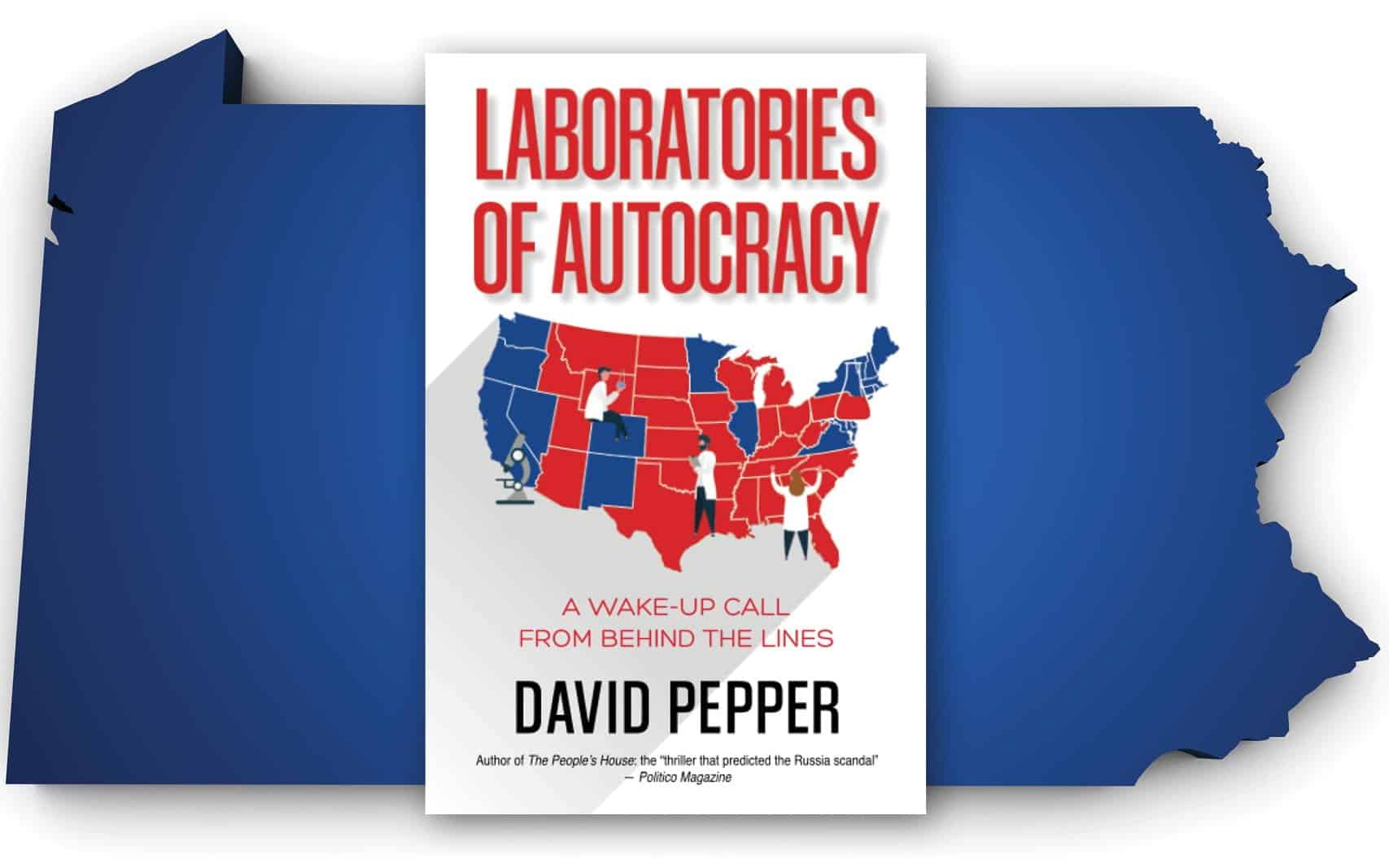A Review of David Pepper’s Laboratories of Autocracy: A Wakeup Call from Behind the Lines.
I just finished crunching the numbers for who turned out in the recent PA primary on May 17 and found a stark reality about the health of democracy in the Keystone state: just under 100,000 more Republicans cast votes than Democrats. While Republicans typically show up more consistently in PA primaries, this is a call to action to make sure Democrats register and vote in this November’s election.
The reason?
If we have Republican Doug Mastriano as Governor instead of Democrat Josh Shapiro, with our Republican-dominated statehouse we can count on a lot of attacks on our civil liberties and democratic rights in the Commonwealth: worsening voter suppression, forced births, rollback of LGBTQ rights, defunding public education, and right to work laws.
How did we get here?
In his book Laboratories of Autocracy: A Wakeup Call from Behind the Lines, author David Pepper recounts his experience as an insider in local and statewide Ohio politics and how a deliberate attack on majority rule began in earnest in the Buckeye State during the Obama administration. From gerrymandering (which allows those in power to select their voters, rather than voters selecting their candidates) that favors minority Republican voters, to Koch Brothers funded organizations such as the American Legislative Exchange Council (ALEC), the Statewide Policy Network (SPN), and PA’s Commonwealth Foundation crafting specific statehouse legislation favoring big business over that which benefits the majority of citizens, Pepper exposes how statehouses have truly become corrupt and unresponsive to those they’re supposed to serve: the people.
Pepper uses his deep knowledge of Ohio politics to draw parallels nationwide. Pennsylvania resembles Ohio in its voting demographics and is also a bellwether state for what the U.S. looks like nationally. The far right has understood that statehouse politics everywhere has been almost invisible in our current media climate, so decidedly undemocratic results have come out of statewide legislation. Anything that is tried by the far right and fails in one state is not tried in another and what works gets replicated over and over.
In an excerpt from Laboratories of Autocracy, Pepper recalls:
“Pennsylvania’s a perfect example, a traditionally blue state that was horribly gerrymandered in 2011. As bad as Ohio. Recall that even after 2018, when Keystone State voters chose Democrats by ten points for the statehouse, Republicans still controlled the statehouse 110-93.”
And how about our Commonwealth’s U.S. Congressional map? Pepper reminds readers:
“In 2018, the state supreme court struck down Pennsylvania’s Congressional map. Recall that it was a 13-5 Republican map after 2012. It stayed that way through the next two cycles, with almost every race a blow-out for the incumbent. A special election in 2017 saw a Democrat pick up one of those seats, but other than that, the maps held. Then came a state court decision in early 2018 striking down the rigged Congressional map, and new districts drawn in the way the League of Women Voters would draw them. What happened under the new lines? A map that had been at 13-5 after 2016 went to 9-9 in the November 2018 election. Maybe most telling? Three of the Republican incumbents didn’t seek reelection in the fairer districts. For different reasons, they knew they couldn’t survive politics in a non-gerrymandered world.”
Pennsylvania’s Supreme Court currently has judges elected in statewide races. Every candidate for judge seats appears on every PA voters’ ballot. There have been attempts to change this so judge seats are regionalized – or gerrymandered – for this statewide office. This is in order to get far right judges to take over the court. A far-right majority on the PA Supreme Court would guarantee that Republican favored gerrymandered legislative districts, both statewide and federally, would remain intact.
Pepper provides a perfect example in his book of how Republicans’ intentions are solely about seizing power rather than promoting free and fair elections with this reminder of former Pennsylvania Republican House Speaker Mike Turzai declaration back in 2012.
“A Pennsylvania legislator bragged that their voter ID law ‘is gonna allow Governor Romney to win the state of Pennsylvania,’” writes Pepper.
Our late wakeup to this has made us dangerously close to becoming an autocratic nation that only has the veneer of democracy. We could be stuck with minority rule for quite a while because of these moves to ensure only the wealthy have a voice or influence in the country’s direction.
But this is not a call for giving up. This is a call for getting involved locally. This is a call for getting others involved locally. Pepper has a thirty-point prescription for shoring up true democracy in this country. I will highlight some of these statewide and individual calls for action to shore up true democracy:
- Taking time to know who your state legislators and state senators are. Knowing what legislation is pending in statewide bodies. If any of this is ALEC or SPN crafted, fight against its passage.
- Making sure there is never an uncontested election race at any level of politics and for every state legislative and state senate district.
- Getting local community stakeholders interested in local electoral politics every year, including school board directorships.
- Having and promoting voter registration forms in public spaces. Promoting year-round registration drives.
- Door to door issue canvassing separate from campaign cycles.
- Supporting local independent media as a consumer and in opinion editorials.
These are not quick fixes but long-term actions for course correction to reverse the corruption, electoral rigging, and minority rule we are at great risk of at every governmental level. And once the door has closed off to democracy, it will be extremely difficult to push back open again.
Pepper’s work also has an extensive bibliography which backs the interesting stories of his fight for democratic process and legislation in Ohio. These recommendations do provide hope that we can do something.
One thing I might add is promoting organized labor as a force majeure stakeholder for promoting democratic ideals. Although union membership is relatively small, it’s still one of the most diverse collectives in our public sphere … generationally, racially, and with all genders. Economic insecurity and inequality is the foundation for public disaffection which causes individuals to disconnect from the political process. Clever right-wing tactics keep working people divided so they can’t unite in solidarity for economic justice and democratic principles. While not included in Pepper’s 30 step prescription, Pepper does describe how organized labor was instrumental in repealing Ohio Senate Bill 5 (2011) which would have severely restricted collective bargaining for unionized public employees.
I might also critique the leadership from the top of the Democratic Party nationally. They, too, have prioritized keeping donors happy over advocating and legislating for ordinary folk. This is why I appreciate the focus on paying attention to local and statewide politics in order to get our voices heard. It’s about grassroots involvement to get popular legislation passed and representatives elected who truly advocate for and serve the people. This book gives you the tools to start organizing to take our democracy back.







